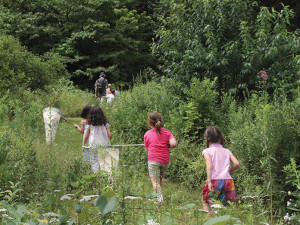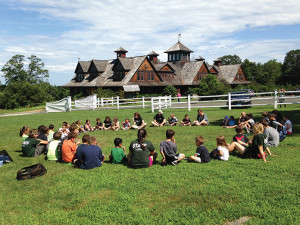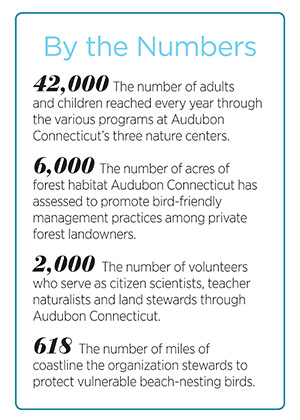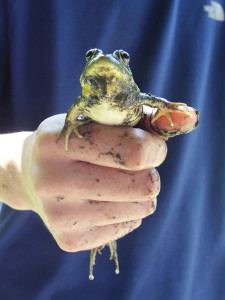Brian Donovan was diagnosed with Asperger syndrome in third grade after years of struggling with anxiety, depression and ADHD. After the diagnosis, the family was on vacation in Florida when his parents saw his interest in birds (and a knack for retaining information about them). When they returned, they took him to Hawk Watch 2013 at the Audubon Center in Greenwich, CT. “Brian was home,” says his father, Rich Donovan. “It was that day he knew he wanted to study birds, and the day I knew I’d have something to share with my son for the rest of our lives.”
Today, Brian is changed; he has a Cornell University banner hanging in his room and he dreams of becoming the world’s greatest ornithologist. “For a boy who struggles every day to find his place, whom Mother Nature has stacked the odds against, to know what he wants to do for the rest of his life at the age of 10 is beyond incredible,” says Donovan.
Whether it’s inspiring a child with special needs, providing a sanctuary where a grown son can connect with his mother who is suffering from Alzheimer’s disease, or helping a troubled student discover math and science skills, stories from the team at Audubon Connecticut prove birds can have a powerful impact.

Audubon’s Main Mission
For these, and many more social, health and environmental reasons, Audubon Connecticut (a local unit of the National Audubon Society) has been passionate about making sure that native birds and their habitats are protected. The Greenwich, CT, center opened in 1943, and today, Audubon Connecticut has expanded to include three Audubon centers, four large sanctuaries and a number of smaller ones, all amounting to 4,500 acres of protected land.
More than just preserving open space, Audubon Connecticut has a range of initiatives, from government advocacy to nature walks, film series, lectures and professional workshops for landscapers, beekeepers, architects and others. It holds frequent school programs, camps and summer programs. One of the most extensive is creating bird-friendly communities. Audubon works with families, landowners, corporations and schools to create wildlife habitats at home or on campus. The organization also partners with town governments to create urban oases at public parks.
“We see the positive impacts it can have on kids and families,” says Stewart Hudson, vice president and executive director of Audubon Connecticut. “Where birds thrive, people prosper.”
Healthy Birds and Communities
Robust populations of birds are symbolic of a healthy environment for animals and people, says Hudson, referencing the old practice of bringing a canary into the coal mine to serve as a warning that there were dangerous gases in the mines. If the bird died, they had to exit immediately.

“Like the canary in the coal mine, if you are watching a rapid disappearance, something is wrong.” Studies done by ornithologists at Audubon show 314 species of birds are threatened by climate change, including owls, sparrows, plovers and ospreys. Their decline can be traced back to increased water and air pollution, use of pesticides and the spread of invasives (exotic species of plants that do nothing to contribute to their local ecosystems and can be harmful). To combat this, many of Audubon’s campaigns and programs are geared toward raising awareness and advocating for environmental legislation to protect water quality, clean up watersheds, preserve open space and reduce harmful practices including planting invasives and using pesticides.
Benefits of Birds
The pros of preserving bird habitats go beyond the environment. One of Audubon’s top concerns is the growing disconnect between people and nature. Studies have shown that areas with more ways for people to connect with nature have fewer incidents of crime and mental health issues, says Michelle Frankel, center director at Audubon Greenwich.
 She shared the personal example of one of Audubon’s own board members. He visited Audubon Center in Greenwich with his mother when he was a boy, and, occasionally even as an adult. Later in life, when his mother was diagnosed with Alzheimer’s disease and could no longer remember or recognize people and places, he would bring her to the center, and for five to 10 lucid moments, she was her old self again. “He would take her here and it was miraculous. He had his mom back,”
She shared the personal example of one of Audubon’s own board members. He visited Audubon Center in Greenwich with his mother when he was a boy, and, occasionally even as an adult. Later in life, when his mother was diagnosed with Alzheimer’s disease and could no longer remember or recognize people and places, he would bring her to the center, and for five to 10 lucid moments, she was her old self again. “He would take her here and it was miraculous. He had his mom back,”
says Frankel.
There are also vast educational benefits to bird habitats, says Frankel, and Audubon has a rich history of nurturing those. It was the
first nature education center in the country developed by Audubon.
“We’ve trained thousands of teachers who have educated countless numbers of kids on nature education,” says Frankel. “It’s spurred a whole trend of nature education centers around the country.”
Learning Through Nature
 One of the goals of Audubon is to close the science achievement gap in Connecticut. Through programs with Audubon, students of all ages can participate in scientific research, learn to analyze data and understand the principles of sustainability—and educators are seeing results.
One of the goals of Audubon is to close the science achievement gap in Connecticut. Through programs with Audubon, students of all ages can participate in scientific research, learn to analyze data and understand the principles of sustainability—and educators are seeing results.
For one troubled student in downtown Stamford who was diagnosed with ADD and had behavior issues, the experience was transformative. During the third session of a schoolyard habitat program with Audubon, he was introduced to binoculars and discovered he had a particular ability to find birds with them. “He thought it was the coolest thing, and eventually became a leader in his group and the biggest fan of our educator,” says Frankel. “A student who wasn’t able to perform in the classroom setting found a place where he could really shine.”
How to Help if You Have…
Ten Minutes Start a buzz! Have a conversation with your neighbors about the value of creating healthier habitats for birds and people, and how Audubon can help. Click here to learn more.
An Hour Pay a visit to local birding hot spots with an Audubon guide. Saturdays, meet at the parking area at Audubon Greenwich from 7 to 8:45 a.m. Wednesdays, meet at the Fairchild Wildflower Garden at Audubon Greenwich from 7 to 8:30 a.m. Call Ted Gilman at 203-930-1353 or email greenwichcenter@audubon.org. Click here for upcoming events.
An Afternoon Start your very own backyard habitat. Plant native plants that will provide food and shelter for birds of our region. You can purchase native plants during the Audubon Greenwich “For the Birds” Native Plant Sale through April. Orders are due May 1 and available for pick up starting May 9. (International Migratory Bird Day). Call 203-869-5272, ext. 239, or visit greenwich.audubon.org/plant-sale.
Contact: Visit audubonct.org for contact information for the center near you, or to become a member.
$1 from each Serendipity subscription purchased in March 2015 goes to Audubon Connecticut. Subscribe here.




